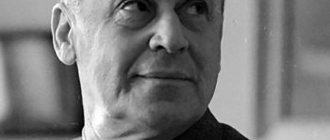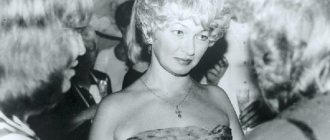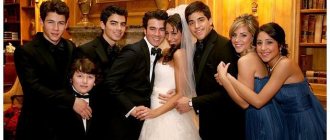Larisa Golubkina is one of the film actresses of Soviet and Russian cinema. She has embodied various characters on stage throughout her life. The star herself says that she likes playing live in front of the audience much more, as she can feel their support.
Since the late 60s, Golubkina has been actively touring. She performs songs of many Soviet pop stars. For her activities, Larisa Ivanovna was awarded various state awards.
I tried to improve my personal life as a film star twice. According to her stories, she lived 10 years of bottomless happiness with Andrei Mironov. After his sudden death, his woman remained faithful to his memory.
Biography
Larisa Ivanovna Golubkina was born in Moscow. My father was a military man, my mother was a cutter. For some time the family lived in Germany.
“At first, dad was at war, and when he returned, we left for Germany. But out of the ten years that my parents spent there, I only lived with them for two years. There was no school in the garrison where my father served, so I returned and lived in Moscow on my own throughout high school. Do you know what is most amazing? It seemed like I was left alone. Do what you want! But I didn’t have any confusion in my head. In the ninth grade, I entered the conducting and choral school, and later began attending lectures at the Faculty of Biology of Moscow State University. And no nonsense even occurred to me... That is, apparently, they planted something in me so firmly. Not a step back, not to the right, not to the left. Execution! Moreover, I myself understood that I didn’t need it,” says Larisa Ivanovna.
After music school, Larisa entered GITIS in the department of musical comedy actors, from which she graduated in 1964. “My teacher, the famous opera singer Maria Petrovna Maksakova, saw me only on the opera stage. I even have her handwritten wish: they say, Larisa, you shouldn’t bury the talent that nature has given you.”
Childhood
Lara was born on March 9, 1940 in Moscow.
Her mother, Klavdiya Mikhailovna Golubkina, born in 1914, had the profession of a cutter. Dad, Ivan Pavlovich Golubkin, born in 1916, worked as a teacher. From the first days of the war he went to the front, his wife was left alone with a little daughter in her arms. Having been seriously wounded, he was demobilized, returned to his family and mastered a new profession for himself - a military teacher. He suggested that his wife no longer work, but devote herself entirely to housekeeping and raising her daughter.
Larisa showed her creative inclinations from early childhood. The girl was musically gifted and very artistic. Already at the age of three she performed not only children's songs, but also romances. When guests came to her parents, Lara climbed onto a stool and sang with pleasure.
Debut
But everything changed after the release of Eldar Ryazanov’s film “The Hussar Ballad,” in which Larisa Golubkina starred in her third year. The role of Shurochka Azarova brought her all-Russian fame. In the first six months, the film was watched by 49 million viewers. “After the release of “The Hussar Ballad,” I began to receive mountains of letters, and many immediately began to ask for financial assistance. They decided that since I starred in such a movie, I must be very rich. And I was my mother and father’s daughter, I lived on their salary and at first I didn’t even know that they paid in the movies. Then a scandal occurred when one cameraman wrote to the Mosfilm newspaper that they were not explaining to young actors that they were working for real, for money. After this article, the director called me and asked why I didn’t contact him about my salary. And I was so glad that I was approved that at first I filmed for free!” recalls Larisa.
Movies
Larisa Ivanovna had no ambitions or fanatical devotion to cinema. She frankly says that if it were not for “The Hussar Ballad”, the viewer would not have recognized such an actress. Eldar Ryazanov’s choice of a second-year student was not accidental: several dozen experienced candidates could not transform from a male image into a female one and vice versa with the same ease.
And Golubkina managed to adapt to a man’s gait, learn to ride a horse and wear a military uniform. The comedy became incredibly popular among viewers of the Soviet Union. Larisa Ivanovna, like her partner on the work site Yuri Yakovlev, woke up famous.
View this post on Instagram
A post shared by @rare_celebs on Oct 10, 2020 at 8:47am PDT
Larisa Golubkina on the set of the film “The Hussar Ballad”
And most importantly, after this film, the father’s attitude towards his daughter’s profession changed, and he said that he was proud of her.
A year later, work followed in the melodrama “Day of Happiness” by Joseph Kheifitz, where the main cast included Tamara Semina, Alexey Batalov and Valentin Zubkov. Larisa Golubkina had to reincarnate as Rita, a young neighbor who is getting married.
The actress continued to play quite memorable roles in the future. In 1965, Eldar Ryazanov’s adventure comedy “Give me a book of complaints” was released on the screens, in which the actress appeared in the image of Tatyana Shumova, the head of the youth cafe “Dandelion”, which enjoys a bad reputation. To restore the establishment to its former glory, journalist Yuri Nikitin (Oleg Borisov), who is in love with her, rushes to the girl’s aid.
A year later, Larisa Golubkina tried on a fairy-tale image - in the film adaptation of Pushkin’s “The Tale of Tsar Saltan” she played the Tsarina. Already in 1968, she began acting in Yuri Ozerov’s grandiose project “Liberation” in the role of nurse Zoya. Nikolay Olyalin, Sergey Nikonenko, Vsevolod Sanaev, Vladimir Samoilov also shone in the film. Larisa's heroine reached Berlin itself.
View this post on Instagram
A post shared by @rare_celebs on Jun 4, 2020 at 9:12am PDT
The film was created and shown over the course of four years, and during this time interest in the film did not fade, and nurse Zoya, played by Larisa Golubkina, became a symbol of wartime romance. After a large-scale project in the actress’s creative career, a melodramatic role in the musical comedy “Large Guys” followed.
The “Benefit Performance of Larisa Golubkina” turned out to be unusual, which was mounted based on the play “Pygmalion” by Bernard Shaw. Only the director added several new musical numbers, so Larisa sang and danced a lot, mostly in a parody style.
1979 gave the artist’s fans a new meeting in the comedy “Three in a Boat, Not Counting the Dog,” where her husband Andrei Mironov and the popular acting duo, family friends Alexander Shirvindt and Mikhail Derzhavin became partners. In the same year, Larisa Golubkina appeared in Stanislav Govorukhin’s cult crime film “The Meeting Place Cannot Be Changed,” where she appeared in the image of a railway worker.
The actress remained in demand until the mid-80s, and then focused on theater and television activities. Only in the 21st century did Larisa Ivanovna begin to appear in films again. The celebrity’s filmography was replenished with roles in the detective story “Picturesque Adventure”, the social drama “Golden Mountains”, Golubkina was also involved in episodes of the melodramas “The Ideal Couple” and “Mamuka”.
View this post on Instagram
A post shared by Ivan Sadovnikov. From Russia. (@ivan.sadovnikov) on Mar 8, 2020 at 10:44pm PST
Larisa Golubkina and her roles
The artist often becomes a guest on programs. In 2013, she spoke about events from her own life in the project “Wife. Love story". With the participation of the actress, Tatyana Ustinova’s program “My Hero” was aired on the TVC channel in 2016. In addition, Golubkina starred in the programs “Life Line” and “Main Role”, shown on the “Culture” TV channel, and visited the studio of the shows “Alone with Everyone” and “Tonight”.
Larisa Ivanovna recalled “Dancing with the Stars” with particular pleasure. And even though she had to see a sports doctor because of problems with her legs, she later began to move more confidently not only on the floor.
Theater
In 1965, after graduating from GITIS, Larisa became an actress at the Central Academic Theater of the Soviet Army (CATSA, now TsATRA). On the stage of this theater she played with great success in the play “Soldier and Eve”.
By the way, in the theater she also played the role of Shura Azarova. True, in the Soviet Army Theater this performance was called “A Long Time Ago.” Then there were roles in the productions of “Renaldo Goes into Battle” (Angelica), “The Sea Spreads Wide” (Elena), “The Law of Eternity” (Marie), “The Last Fervent Lover”, “The Finding” (Lida), “Macbeth” by William Shakespeare (Lady Macduff), “God Save the King” by Somerset Maugham (Gwen), “The Heart is Not a Stone” by Alexander Ostrovsky (Apollinaria Panfilovna), “Love is a Golden Book” by Alexei Tolstoy (Catherine II), “Late Love” by Alexander Ostrovsky (Shablova ).
She played in Leonid Trushkin’s enterprise performance “Honoring” (Anton Chekhov Theatre), etc.
Larisa Golubkina now
Since 1965, the public's favorite has been faithful to the Russian Army Theater. Now she speaks to the audience in the first person in the solo performance “Larisa Golubkina. Patches."
“Everything else, when you play another person, seems artificial and fake to me. The acting profession is quite limited. You are always in the grip of someone else's material. Dramatic theater is a spiritual undressing, a kind of striptease, and I can no longer “be naked” much, either literally or figuratively.”
At the Alexander Pushkin Theater, the actress is involved in the comedy “Bachelorette Party Club” together with Vera Alentova and Maria Aronova. According to the star of the melodrama “Moscow Doesn’t Believe in Tears,” Golubkina was introduced to the play a week before the premiere, and there would hardly have been any other colleagues who “did the job so brilliantly and professionally in such a short time.”
View this post on Instagram
A post shared by SOCIETY CHRONICLE (@taini_zvezd) on Jan 27, 2020 at 10:50pm PST
In March 2020, Larisa Ivanovna celebrated her 80th birthday. The artist intended to spend the holiday in a quiet sanatorium, sitting on the balcony and indulging in reflection.
Golubkina went to rest as soon as she left the hospital, where she ended up because of a “lame hussar’s leg.” In an interview, she explained that she was paying for the passion inherent in her youth to perform her own stunts on the set. So, Larisa, jumping from the balcony in the “Hussar Ballad”, tore the ligaments of her ankle.
Meanwhile, the media circulated the news that the celebrity’s long-standing illness had worsened. And in 2019, Golubkina’s fans were shocked by the news of her death. Later it turned out that this was not a rumor, but, more correctly, a mistake: the actress’s namesake had died.
Movie
After “The Hussar Ballad,” bright, memorable roles followed in the films “What should we call you now?”, “Give me a book of complaints!”, “Day of Happiness.” Among the actress’s other notable film works are the Tsarina in “The Tale of Tsar Saltan” and Zoya in the epic “Liberation.”
In the company of Andrei Mironov, Alexander Shirvindt and Mikhail Derzhavin, Larisa worked in the television film “Three in a Boat, Not Counting the Dog.”
In 1994 she starred in the film “Simple-minded”, in 2001 she played in the TV series “Mamuka”.
Personal life
Larisa Ivanovna was married twice. She got married in the early 1970s, but the marriage did not last long. The second husband is theater and film artist Andrei Mironov, with whom they lived together for 14 years. Andrei Alexandrovich sought Larisa’s hand for ten years, repeatedly proposing to her. They got married in 1976. Mironov adopted Larisa’s daughter from her first marriage, Maria. Now she is a famous actress. After Andrei's death, she never married again.
Music career
The stage success that accompanied Larisa Golubkina in her performances was complemented by her extremely successful variety activities. The actress became famous in the 60s for performing Russian romances and songs by a number of Soviet composers. While still serving in the theater, she performed with the popular orchestras of Leonid Utesov and Anatoly Kroll, with a quartet led by Yuri Malikov, with famous pianists David Ashkenazi, Boris Mandrus and many others.
The stage success that accompanied Larisa Golubkina in her performances was complemented by the success of her variety activities.
In the 70-80s, Larisa Golubkina toured the Soviet Union a lot with pop concerts with her famous husband Andrei Mironov and accompanist Levon Oganezov.
In the 70-80s, Larisa Golubkina toured the Soviet Union a lot
The singer's vocal skill was especially clearly demonstrated in her romance repertoire. In 1991, in Moscow, at the Rossiya State Central Concert Hall, Golubkina’s first solo concert took place: she performed Russian romances accompanied by the Folk Instruments Orchestra named after. Nikolai Osipov.
The singer's vocal skill was especially clearly demonstrated in her romance repertoire.
In 1999, the actress participated in the prestigious project of Viktor Merezhko “Theater and Film Stars Sing.” The Russian romances performed by her were so magnificent that Golubkina’s music disc was even soon released in the United States, which was then duplicated by Radio MPS.
Larisa participated in the prestigious project of Viktor Merezhko “Theater and Film Stars Sing”
Along with touring activities in the Russian Federation and abroad, the actress took part in the work of the jury of the All-Russian Acting Song Contest named after. Andrey Mironov (established in 1990).
Larisa Golubkina's talent allowed her to try her hand as a TV presenter
The versatile talent of Larisa Golubkina allowed her to try her hand as a TV presenter in the programs “Morning Mail” and “Artloto” recognized by the viewer. The actress was also remembered by fans of the TV show “Exactly the Same” (2015), where she sang her signature song “A long time ago” with Aglaya Shilovskaya.
Filmography: Actress
- Scenic Adventure (2007)
- The Heart Is Not a Stone (2002)
- Mamuka (2001)
- Simple-minded (1994)
- Tragedy of the Century (1993)
- No need to be sad (1985)
- Together with Dunaevsky (1983)
- Almanac of Satire and Humor (1983)
- Three in a Boat, Not Counting a Dog (1979)
- War Forties (1975)
- Benefit performance of Larisa Golubkina (1975, film-play)
- Mister Puntila and his servant Matti (1974, film-play)
- Liberation (1968-1971)
- The highest... (1967, film-play)
- The Tale of Tsar Saltan (1966)
- What should we call you now? (1965)
- Give me a book of complaints (1965)
- Happy Day (1963)
- Hussar Ballad (1962)










